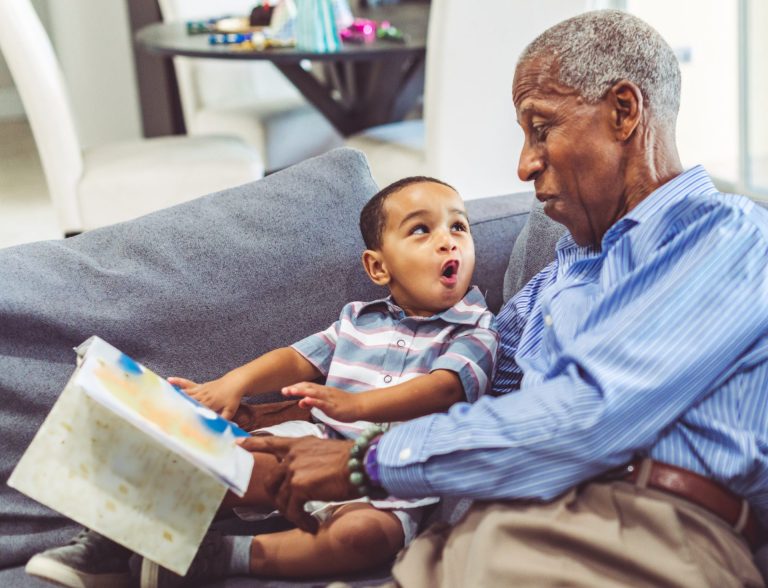Dementia affects more than just the person diagnosed—it ripples through the entire family. If you’re part of the sandwich generation (hi, hello, I see you also juggling kids, aging parents, and a cold cup of coffee 👋🏼), you may be navigating a tough new chapter: explaining dementia to your kids in a way that makes sense and doesn’t scare them.
Good news—you don’t have to do it alone. Let’s talk about how to break it down in kid-friendly ways, make space for big emotions (from everyone!) and help your child stay connected with the grandparent they love, even as things change.
Table of Contents
-
What is dementia, and why do kids need to know?
-
How do you explain dementia to a child in simple terms?
-
What age should you talk to your kids about dementia?
-
How can you maintain the bond between your child and a loved one with dementia?
-
What if your child is scared or upset?
-
Tips for sandwich generation parents: How to manage it all
-
Books, shows, and resources to help explain dementia to children
What is dementia and why do kids need to know?
Dementia is not a specific disease—it’s a collection of symptoms that affect memory, thinking, and social abilities. Alzheimer’s is the most common type. And yes, it can be confusing and even a little scary, especially when it’s happening to someone your child loves deeply.
So, why bring it up?
-
Kids notice when something’s off.
-
They hear whispered conversations and see the grown-ups crying in the kitchen.
-
If we don’t explain it, they’ll make up their own (often scarier) version of the truth.
Being honest—gently, lovingly, and age-appropriately—can actually make kids feel safer and more secure.
How do you explain dementia to a child in simple terms?
Keep it short, clear and warm. Here are some go-to scripts for younger kids:
“Grandma has an illness called dementia. It makes it hard for her to remember things or do certain things she used to do.”
“It’s not something you can catch, like a cold. And it’s not because of anything anyone did.”
“She still loves you—even if she forgets your name sometimes.”
Comparisons and metaphors to explain dementia to kids:
-
A puzzle with missing pieces: Grandma’s brain is like a big puzzle. Some of the pieces are missing now, so things don’t always make sense to her the way they used to.
-
Like a bookshelf tipping over: Imagine a tall bookshelf with all of Grandma’s memories on it. Sometimes, the shelf gets wobbly, and the newer books fall off first. The older ones—like when she was a kid—stay on a little longer.
- A treasure box with a tricky lock: She still has lots of wonderful memories and love inside her, but sometimes the lock is jammed and she can’t get them out.
Some kids really get metaphors.
What age should you talk to your kids about dementia?
If they’re old enough to notice, they’re old enough to know—at least a version that matches their age and stage.
Toddlers (2–4): Keep it super simple. “Grandpa is sick and sometimes forgets things.”
Little kids (5–8): Use stories, pictures, and metaphors to explain what’s happening. Expect questions, even the most bizarre ones!
Tweens (9–12): Be more honest about the progression. They can handle a bit more complexity.
How can you maintain the bond between your child and a loved one with dementia?
This one hits hard. Watching a beloved grandparent slip away is heartbreaking. But the connection doesn’t have to disappear.
Simple ways to keep the bond alive:
-
Create a photo book: Add pictures of your child and their grandparent doing things together. Flip through it during visits.
-
Draw together: Art is a shared language that doesn’t require words.
-
Music magic: Play old songs your parent loved. Music taps into deep memory and can trigger joy.
-
Storytime: Have your child read aloud to their grandparent—or vice versa if it still works.
-
Snuggle time: Hugs go a long way.
Your child might not remember what was said, but they will remember how it felt to be there.
What if your child is scared or upset?
Fear is a natural response—especially when a loved one suddenly acts “weird” or forgets names. Or even gets frustrated and acts out.
What helps:
-
Give them a script: “You can say, ‘Hi Grandma! It’s me, Lily. I brought your favorite cookies!’”
-
Normalize their feelings: “I felt nervous too, the first time.”
-
Debrief after visits: “What did you notice? Anything surprise you? How did it feel?”
Sometimes, just talking it through is enough to shift fear into understanding.
What to Do When Dementia Outbursts Happen in Front of Your Kids
When a parent with dementia acts out—like the time my mom spat at me because she swore my cooking was terrible and I didn’t belong in her house—it can be jarring for you and your kids. Here’s how to handle those tough moments when little eyes are watching:
-
Stay calm and grounded. Your reaction sets the tone for your child. Keep your voice steady, even if your heart’s racing.
-
Explain simply. Later, tell your child, “Grandma’s brain is sick, and sometimes that makes her say or do things she doesn’t mean.”
-
Validate their feelings. Let them know it’s okay to feel scared, sad, or confused.
-
Offer comfort. Hugs, a favorite snack, or a little distraction can go a long way.
-
Don’t force closeness. If your child needs space from visits after an episode, honor that. Emotional safety matters for them, too.
It’s okay to skip a visit!
Really. If bringing your child causes distress for your parent—or if it leaves your little one feeling scared or confused—it’s more than okay to sit one out. You’re not failing anyone by protecting your kid’s emotional well-being or honoring your parent’s comfort. Some days, space is the kindest choice for everyone, including yourself ♥
Tips for sandwich generation parents: How to manage it all
Okay, deep breath. You’re not just parenting your kids—you’re caring for your parents, managing a house, and somehow holding it all together (For me, coffee and dry shampoo)
Here’s how to survive this season:
1. Lower the bar
Perfection is not the goal. Love, stability, and snacks are much more doable.
2. Let people in
-
Say yes when someone offers to babysit, drive, or drop off dinner.
-
Talk to your partner or siblings about tag-teaming care duties.
-
Reach out to friends who get it.
3. Take care of you
Cliché? Yep. Still essential? 100%.
-
Walks.
-
Deep breaths.
-
Group chats with funny memes.
-
Therapy (highly recommended).
Burnout helps no one. Especially not the tiny humans who still need you to find their missing shoe at 7:30 a.m. (Enter: Mabel’s Labels)
Books, shows, and resources to help explain dementia to children
Sometimes the best way to explain something big is to let a story do it for you.
Kid-friendly books:
-
Grandpa and Me by Karen Katz (great for toddlers)
-
Wilfrid Gordon McDonald Partridge by Mem Fox (a classic for ages 4–8)
-
Really and Truly by Émilie Rivard (for older kids)
You don’t have to get it perfect. You just have to show up.
If you’ve made it this far, you’re already doing something right. Talking to your child about dementia isn’t about having all the right words—it’s about showing up with love, honesty, and a willingness to listen.
Yes, it’s a lot. But this messy, emotional middle? It’s also where the magic happens, where your child learns empathy. Where they understand how to love someone even when it’s hard. Where you remember that you’re stronger than you think. I’m right here with you.


